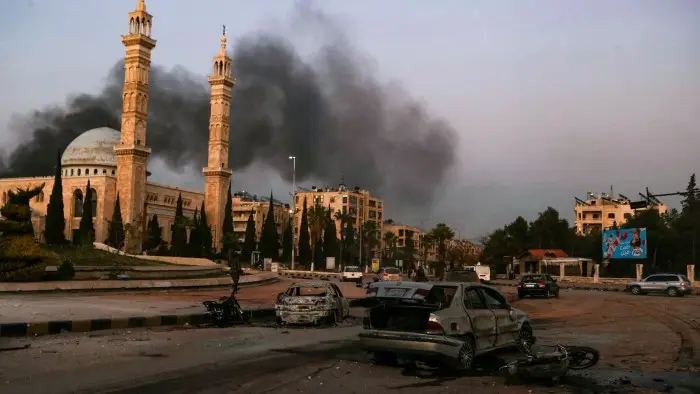Syrian rebels press southward after seizing Aleppo

Access the Editor’s Digest at no cost.
Roula Khalaf, the Editor of the Financial Times, shares her top story picks in this weekly newsletter.

Syrian rebel forces announced they are advancing south after capturing a large portion of Aleppo, the country’s second-largest city, including its international airport. This rapid offensive represents the most significant threat to Bashar al-Assad’s government in recent years.
Thousands of fighters, guided by the Islamist organization Hayat Tahrir al-Sham, made their way into Aleppo city, home to around 2 million residents, on Friday. Over the weekend, opposition-affiliated social media platforms shared images of them hoisting their flag at the city’s fortress and taking pictures at its airport.
The insurgents, who began their attack on Wednesday, reported that their troops had made progress in several areas from their base in Idlib province, located in northwestern Syria. HTS aimed to move towards the significant government-controlled city of Hama, south of Aleppo, and asserted that they had taken control of at least four towns in Hama province. However, the Syrian army rejected these claims.
In his initial public statements since the beginning of the military campaign, Assad expressed that his nation would persist in safeguarding its stability and territorial integrity against terrorists and their backers. These comments were reported by the state news agency Sana.
The remarks were made during a conversation with Emirati leader Mohammed bin Zayed, a supporter of Assad, who highlighted the UAE's unity with Syria and its commitment to fighting terrorism.
It was uncertain if Assad had come back to Syria after his trip to Moscow earlier this week.
The Syrian army refuted claims that the rebels had taken control of Aleppo. However, they went on to announce that they were repositioning their troops in anticipation of a counteroffensive, which would be backed by Russian airstrikes, and were working to reinforce their defensive positions following several days of intense combat. According to the defense ministry, many Syrian soldiers lost their lives at the hands of the rebel forces.
Assad is confronting growing challenges both at home and from abroad in a nation ravaged by a civil war that began following a popular uprising in 2011. He managed to suppress the initial rebellion with military support from Russia, Iran, and Iranian-affiliated groups like Hizbollah, the militant organization from Lebanon.
Even though they have reclaimed two-thirds of the nation, years of fighting and a severe economic downturn have left it devastated.
In recent years, the intensity of the fighting has mostly diminished, with the remaining rebel factions being forced into the northern and northwestern regions near the Turkish border.
In the last year, Israel has increased its air strikes on targets in Syria linked to Iran while simultaneously conducting an offensive against Hizbollah in Lebanon. This action has significantly weakened groups that were crucial in supporting Assad’s regime.
HTS's advancement further into Syria is a significant humiliation for Assad, highlighting the vulnerabilities of his regime. It seems that this offensive has been in the works for a long time and coincides with a period when Assad's supporters are distracted by their own struggles in Ukraine and the Middle East.
HTS chief Abu Mohammad al-Jolani stated in an old video that his troops won’t stop “until we get to the center of Damascus.” This footage was shared again over the weekend on social media platforms associated with the group.
Russian aircraft targeted rebel strongholds in an effort to halt their progress. According to state news agencies, Russia's defense ministry reported that its military had eliminated "at least 300 militants through missile strikes on command centers, storage facilities, and artillery sites."
Media associated with the opposition reported multiple Russian airstrikes in Idlib over the weekend, specifically on Saturday night and Sunday.
Russian Foreign Minister Sergei Lavrov held talks with his Turkish counterpart Hakan Fidan regarding the situation in Syria. He also communicated with Iran’s Foreign Minister Abbas Araghchi, who is anticipated to visit Damascus on Sunday and Ankara on Monday. This comes as the key nations involved in the Syrian issue start to engage in increased diplomatic activity.



















































